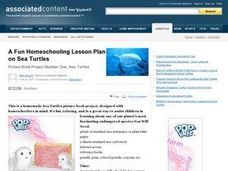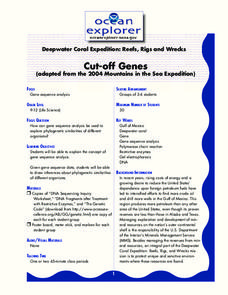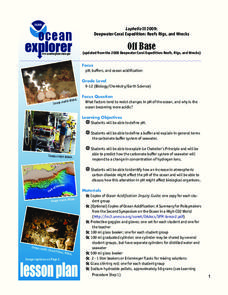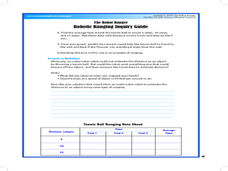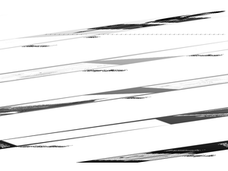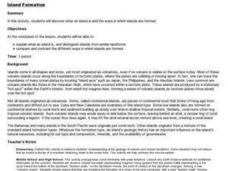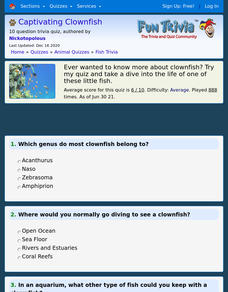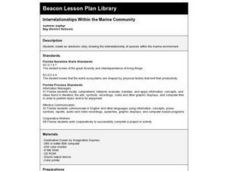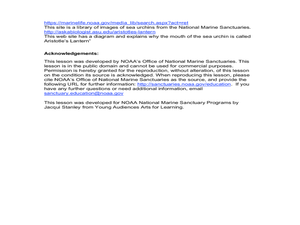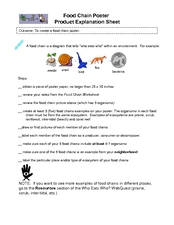Curated OER
What Does it Take to be a Survivor: Part 2
Students explore adaptation by completing worksheets. In this fish anatomy lesson plan, students identify the different survival strategies fish utilize to live in the ocean and the adaptation their bodies have gone through over millions...
Curated OER
Homeschooling Lesson: Sea Turtles
Students write down the names of common turtles and observe pictures of various types. In this sea turtles lesson, students review names and features of these animals, label and draw a picture. Students research habitat, migration,...
Curated OER
Cut-Off Genes
Students explain the concept of gene sequence analysis. In this gene lesson, students draw inferences about phylogenetic similarities of different organisms.
Curated OER
Coasts
Young scholars explain the different types of marine coasts and where they are located in the United States and its territories. They explain and identify some of the life forms that inhabit different marine coastal regions.
Curated OER
Off Base
Students explain the Chatelier's Principle. In this pH lesson plan, students identify factors that resist changes in pH of the ocean and why the ocean is becoming more acidic.
Curated OER
The Robot Ranger
Students participate in an experiment to understand how robotic systems can estimate distances. In this robotic ranger lesson, students measure the the time it takes for and object to move back and forth. Students will use a...
Curated OER
Big Enough?
Students explore the concept of density and buoyancy. In this physics lesson, students discover the different factors that affect an object's density and buoyancy in water. Students conduct several investigations to further...
Curated OER
It's the Law
Students explain various scientific laws used in SCUBA diving. In this theory based instructional activity, students examine and explain how temperature, density, and salinity relate to SCUBA diving using various scientific laws to...
Curated OER
An Oceanographic Proxy
Students conduct experiments on a sample of sea water. In this oceanography instructional activity, students inquire how conductivity is used to approximate the salinity ocean water. Students construct their own conductivity meters...
Curated OER
Island Formation
Students create models of how islands are formed by hot spots and then write a summary of their observations and of how they think their model relates to volcanic hot spots and island formation.
Curated OER
Conserving Marine Life
Students discuss the different threats to various marine life. Through research, groups examine threats to specific marine life, evaluate the situation, and develop possible solutions to help marine life regain stability. Conservation...
Curated OER
Pacific Atolls and Island Groups
Students construct, interpret and translate maps and geographic data. Given a worksheet, students identify an island, an atoll, a scale, and a compass rose. Students grid systems, legends, and symbols. They use the map to find answers to...
Curated OER
Breaking News English: Loss of Nature Will Damage Economies
In this English activity, students read "Loss of Nature Will Damage Economies," and then respond to 1 essay, 47 fill in the blank, 7 short answer, 20 matching, and 8 true or false questions about the selection.
Curated OER
Captivating Clownfish Quiz
In this online quiz worksheet, students answer a set of multiple choice questions about clownfish. Page includes links to answers and resources.
Curated OER
Dino Detectives
As students examine maps of Utah, 4th graders search for clues about what prehistoric life was like in Utah.
Curated OER
The Cay
Fifth graders read The Cay as a shared literature experience. This lesson plan has many good activities across the curriculum to keep your students actively engaged in the story. They will do math, art, music, science and geography...
Curated OER
Interrelationships Within the Marine Community
Fourth graders create an electronic story showing the interrelationship of species within the marine environment. They utilize the educational software, 'Destination Ocean' during this engaging lesson.
Curated OER
the Potential Consequences of Climate Variability And Change
Students analyze the consequences of changing variables on a system. Changes in a model are measured and recorded and conclusions drawn based on the data provided in this six lessons unit.
Curated OER
Island Research
Students collaborate to gather information about the geography, history, economy, climate, culture, and other aspects of life on the island of Eleuthera.
Curated OER
Depending On Each Other. Communities And Ecosystems
Seventh graders investigate how the ecosystems of the world has influence upon the immediate and nonimmediate environments. The interelationships of food webs is discussed. The class researches one type of ecosystem for a class project...
Curated OER
Parched! No Water, No Town
Students discuss the benefits of water conservation. Given a data sheet, they document their water usage over a specified period. Water usage data is graphed and analyzed. Students discuss ways in which they can conserve water.
Curated OER
Sea Urchins - Diadema Antillarum
Students investigate oceanography by painting sea life. In this crustacean lesson, students identify sea urchins in our ocean environments and describe the functionality of their spherical-shaped bodies. Students design their own sea...
Curated OER
Food Chain Poster Instructions
In this food chain worksheet, students follow a set of 9 steps to create a food chain poster. Page has no additional activities.
Curated OER
Sedimentary Size and Structures
Middle schoolers interpret the Earth's history from models. In this investigative lesson students create sedimentary deposit models.
Other popular searches
- Coral Reefs Coloring Pages
- Coral Reefs Lessons
- Ocean Coral Reefs
- Coral Reefs Videos
- Coral Reefs of Australia
- Painting Coral Reefs
- Sharks Coral Reefs
- Coral Reefs of Austraila
- Coral Reefs Tourism
- Coral Reefs Lesson Plans
- Formation of Coral Reefs
- Florida Coral Reefs



